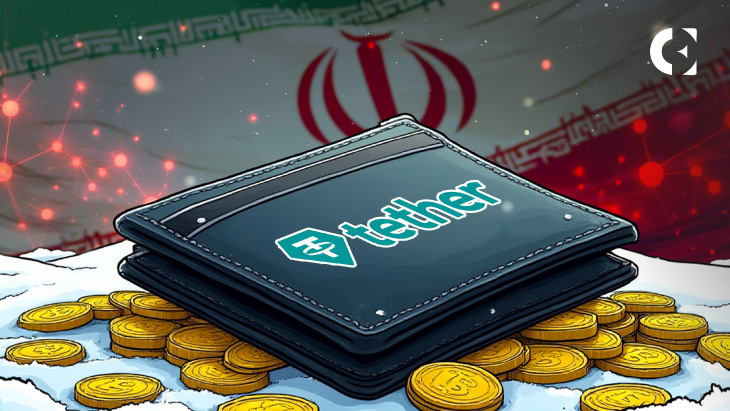- Tether has frozen 112 wallets on the Tron and Ethereum networks holding ~$700M in USDT.
- An on-chain analyst linked the freeze to efforts to curb Iranian sanctions evasion.
- The majority of the frozen wallets are reportedly hosted on the Tron blockchain
Tether has frozen 112 wallets holding approximately $700 million in USDT on the Tron and Ethereum blockchains, a move that is linked to Israel-Iran tensions and at the same time when there is a renewed push within the US for stablecoin legislation.
The action was first highlighted by the on-chain analyst known as Cryptadamist, who revealed that the majority of the frozen wallets, particularly the top 40, are hosted on the Tron blockchain. The move has put a spotlight on the use of USDT and the Tron network by Iranian crypto users to potentially navigate international sanctions.
What’s the Connection to Iran and Nobitex?
According to the analyst’s report, one of Iran’s largest crypto exchanges, Nobitex, is a central player in this ecosystem.
Related: Tether Gold (XAUt) Gets Cross-Chain Upgrade as XAUt0, Rolls Out on TON
According to Cryptadamist, Nobitex openly instructs users on how to bypass sanctions by using intermediary wallets when transferring USDT. The scale and openness of these activities have raised eyebrows–especially following a recent $90 million hack of Nobitex, allegedly carried out by Israeli hacktivists.
Why Is the Timing of the Freeze Raising Questions?
The 112 frozen addresses received nearly $700 million in USDT before being frozen, with the top four wallets locked down four days ago, a full two days after the highly publicized “pig butchering” scam wallet seizure by Tether, Coinbase, and OKX.
While some wallets may be tied to pig butchering schemes, the timing and platform-specific nature of these freezes strongly point toward a focus on Iranian-linked crypto activity.
Cryptadamist also noted a sudden and sharp drop in Bitcoin mining activity, which could be indirectly linked to the wallet freeze, especially considering Iran’s significant state-sponsored mining operations.
Are Politics and Profits Part of the Picture?
The on-chain analyst also drew attention to Tether’s historical leniency with Iranian money flows, suggesting a willingness to “look the other way” so long as profits continued. He emphasized that Justin Sun’s Tron blockchain is the backbone of Iran’s USDT flow, while questioning Sun’s current proximity to US political figures, including President Trump.
Related: Binance Users Shed $223 Million in Tether and Bitcoin Holdings to Buy More Ethereum
Cryptadamist brought to surface a previous report from Reuters showing Binance facilitated over $8 billion in transfers to and from Iranian exchanges—a potential violation of US sanctions. Binance and Justin Sun’s firms are now reportedly exploring partnerships with Trump’s new stablecoin venture, USD1.
While some market participants did not agree with the theory, Tether’s move showcases efforts to tackle issues associated with stablecoin adoption across borders.
Disclaimer: The information presented in this article is for informational and educational purposes only. The article does not constitute financial advice or advice of any kind. Coin Edition is not responsible for any losses incurred as a result of the utilization of content, products, or services mentioned. Readers are advised to exercise caution before taking any action related to the company.









